Resources
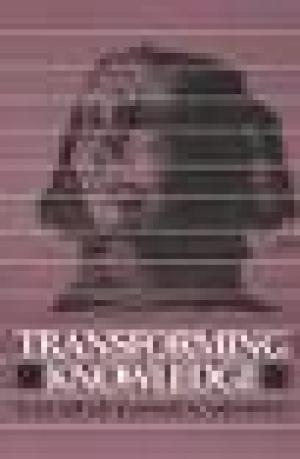
Transforming Knowledge suggests that education can serve neither the quest for knowledge nor the promise of a genuinely democratic system until some very basic intellectual errors are uncovered and corrected. Examining the heritage of a tradition created primarily by white Euro-American men who considered themselves the norm and the ideal for all humankind, Elizabeth Kamarck Minnich identifies these errors, characterizes them, and demonstrates how they work to distort and limit our knowledge. She cites work primarily by feminist scholars and activists, but also from ethnic, peace, and ecological studies, and argues that a reorientation of education and thus thinking and thus knowledge makes sense. This book is the result of more than twenty years of work in higher education during which the author talked with thousands of faculty members, administrators, students, and community people about the necessity to transform the curriculum in this country. Drawing also on her years of work with Hannah Arendt and on Dewey, Kant, Plato, and Socrates, Minnich confronts the "dominant meaning system" that perpetuates errors in thinking, particularly faulty generalization and universalization, circular reasoning, mystified concepts, and partial knowledge. In light of the heated debate in which such critics as William Bennett and Allen Bloom charge that a return to "the classics" is the only acceptable route for education, Transforming Knowledge offers a philosophical analysis of the cultural, intellectual, political tradition behind our curriculum. Minnich warns that it is in and through education that a culture, and polity, not only tries to perpetuate but enacts the kinds of thinking it welcomes, and discards and/or discredits the kinds it fears. (From the Publisher)
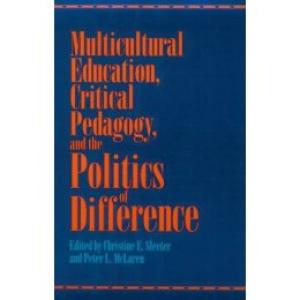
Here is a comprehensive view of leading theories and practices of multicultural education from scholars of various racial and ethnic groups. The perspectives of those often left out of scholarly debate are well represented in this book. Those perspectives offer significant insights into the ways in which dominant ideologies and classroom practices have functioned to serve only one segment of the American population. (From the Publisher)
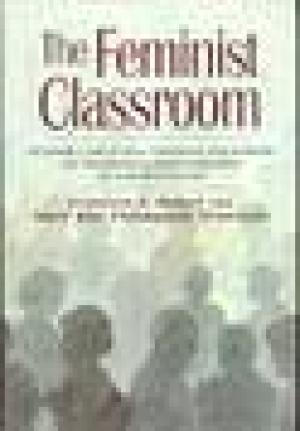
This book provides an intimate view of how feminist teachers are revolutionizing higher education. Drawing on in-depth interviews and on-site observations, and using the actual words of students and teachers, the authors take the reader into the classrooms of seventeen feminist college professors at six colleges and universities - Lewis and Clark College, Wheaton College, the University of Arizona, Towson State University, Spelman College, and San Francisco State University. As these teachers integrate feminist and multicultural content into the curriculum, they demonstrate that pedagogy concerns not only "teaching techniques" but the whole process of the construction of knowledge in classrooms. Learning derives from relationships and interactions among teachers, students, and subject materials, not from any single perspective. In showing how the integration of feminist and multicultural content revitalizes the classroom, the book portrays innovative teaching in action. Feminist and cultural studies scholars have demonstrated that American higher education has traditionally represented the world in terms of the perspectives and achievements of a dominant minority. To educate students for a complex multicultural World, the voices of those who have been excluded need to emerge. There is widespread concern today about the quality of teaching in our colleges, particularly the predominance of lecturing and passive modes of learning. This important book presents a vision of teaching that counteracts the silence and alienation these practices engender. (From the Publisher)
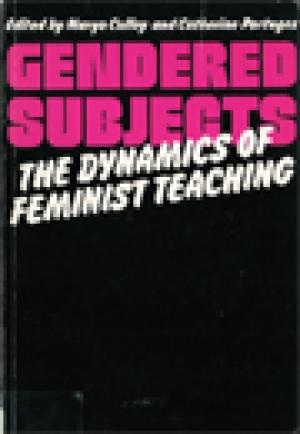
Two decades after the first Women's Studies courses appeared on campuses in the US, feminist research and teaching are now thriving around the world. The editors of this book provide a rich sample of theoretical and practical reflections on classroom experience by teachers of Women's Studies over the past ten years, raising provocative questions which apply broadly to many areas of progressive teaching. The collection features new, unpublished and original work as well as a selection of the best articles to have appeared in recent years. (From the Publisher)
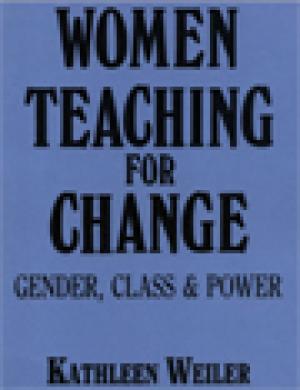
Applying theory to practice, Women Teaching for Change reveals the complexity of being a feminist teacher in a public school setting, in which the forces of sexism, racism, and classism, which so characterize society as a whole, are played out in multiracial, multicultural classrooms. "A fine book, a rich melding of critical theory in education, feminist literature, and pedagogical experience and expertise." Maxine Green, Columbia University. (From the Publisher)
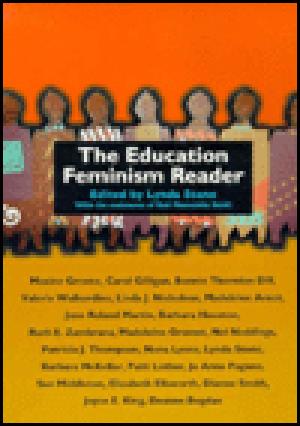
The Education Feminism Reader is an anthology of the most important and influential essays written in feminist education theory since the late seventies. Attentive to the quality and diversity of this growing field, The Reader presents the thinking of traditionally liberal feminists, radical postmodern theorists, women of color and those feminists with psychological, philosophical and political agendas. Contributors: Maxine Greene, Carol Gilligan, Bonnie Thornton Dill, Valerie Walkerdine, Linda J. Nicholson, Madeleine Arnot, Jane Roland Martin, Barbara Houston, Ruth E. Zambrana, Madeleine Gramet, Nel Noddings, Patricia J. Thompson, Nona Lyons, Lynda Stone, Barbara McKellar, Patti Lather, Jo Anne Pagano, Sue Middleton, Elizabeth Ellsworth, Dianne Smith, Joyce E. King, Deanne Bogdan. (From the Publisher)
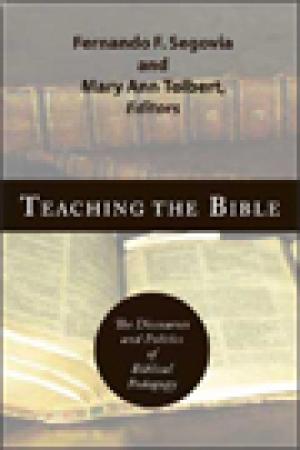
This volume gathers together papers from a broad variety of voices in biblical criticism and theological studies. The papers are divided into four major sections in keeping with their major concerns and aims: Biblical interpretation and theological education, social location and Biblical pedagogy in the US, social location and Biblical pedagogy in global perspective, and Biblical interpretation. (From the Publisher)
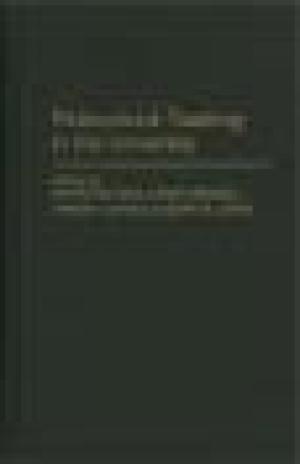
This important book includes more than twenty essays by faculty from different disciplines, each articulating the multiple dimensions and components of multicultural teaching. Teachers discuss their own teaching methods and classes in terms of course content, process and discourse, and diversity among faculty and students in the classroom. This volume integrates new scholarship that reflects a more expansive notion of knowledge, and suggests new ways to communicate with diverse populations of students. (From the Publisher)
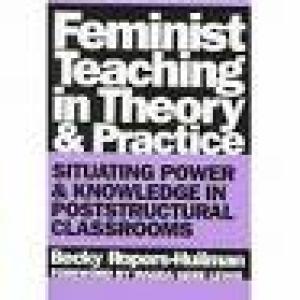
Using a feminist poststructural focus, Ropers-Huilman (Louisiana State Univ.) investigates feminist teachers' positions and styles in order to examine the practices of a theory of teaching. She explores teachers' reflections on power and gender, how they operate in the classroom, and their experiences as innovators in feminist teaching. No one particular approach or process is emphasized. The application of theory to practice allows the 22 teachers who were interviewed to explore and debate the interaction between students and teachers. The complexity of investigating feminist practices, rather than just the teachers themselves, allows a more flexible look at the issues and the social forces defining their interpretations. Ropers-Huilman explores factors contributing to the many forms of feminist teaching and how power affects and shapes the experience. (From the Publisher)
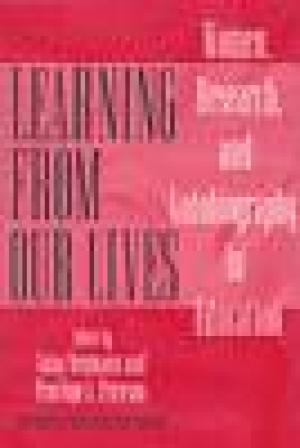
In Learning from Our Lives: Women, Research, and Autobiography in Education, eleven women who are eminent educational researchers speak out intimately, and from these autobiographical accounts, readers experience how research that emerges from diverse women's lives shapes (and reshapes) educational knowledge and discourse. The book offers thoughtful insights into how the field of education might change as women assume positions of intellectual leadership. The distinguished list of contributors includes Kathryn H. Au, Concha Delgado-Gaitan, Maxine Greene, Patricia J. Gumport, Gloria Ladson-Billings, Ellen Condliffe Lagemann, Martha Montero-Sieburth, Anna Neumann, Nel Noddings, Penelope L. PEterson, and Linda f. Winfield. The book will be an important resource for graduate courses in foundations, teacher education, philosophy of education, women and education, research methods, sociology of education, and politics and education; general readers will find it fascinating reading as well. (From the Publisher)